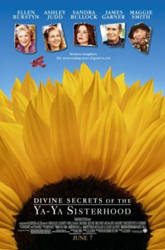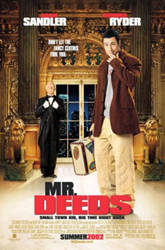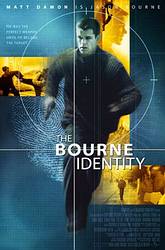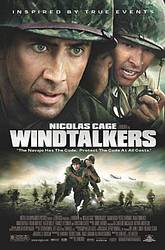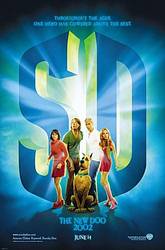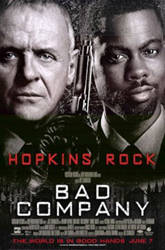 Director: Starring:
OTHER REVIEWS: Double
Take Flawless Down on
Earth Tigerland |
Bad Company BY: DAVID PERRY You can count on one hand how many original ideas are used in Joel Schumacher's Bad Company. In fact, in retrospect, you might not even need that one hand. Not that this is anything new film a film produced by Jerry Bruckheimer, who has found the formulas for a two successful action films and reused them in as many forms as possible. Known for his schlock and sentiment in the guise of testosterone-fueled action sequences, Bruckheimer has discovered a way to hypnotize audiences into marching towards his films every time a new one comes out, regardless of the fact that each one is just a reworking of a previous Bruckheimer production. Any film from him can use one of the following synopses: "mankind is in trouble, life as we know it hasn't a chance; but the heroics of a few good men may save civilization, even if it means their own lives," or "he could not be more different from his colleagues, but the world depends on his knowledge and expertise and he's willing to ally with everyone else if it may stop the impending attack of a factionalist group." Class 1: Top Gun, Crimson Tide, Armageddon, Pearl Harbor, and Black Hawk Down; Class 2: Thief, Beverly Hills Cop, Bad Boys, The Rock, Con Air, and Enemy of the State. There are a few exceptions -- Flashdance, Dangerous Minds, Gone in Sixty Seconds, Remember the Titans -- and sometimes the groups intermix (like Bad Boys), but very rarely are any of them worth watching. Bad Company fits into most of those groupings: mankind is in trouble so the CIA comes to the rescue and there's a black sheep brought in to break the homogeny of the CIA. Oh, and it too is not worth watching. Chris Rock gets to play the fish out of water as Jake Hayes, a two-bit New York ticket scalper. When his identical brother, who he never knew of, dies, Jake is propositioned to take his place. The only problem is that Jake's brother was a well-educated, effete CIA agent undercover in the Czech Republic. The instigator of this replacement is CIA operative Gaylord Oakes (Hopkins), who owes his life to the deceased and sees getting this deal -- an arms purchase from a slimy Russian dealer (Stormare) -- as important to stopping a nuclear explosion on American soil (the film, like the similarly themed The Sum of All Fears, was made before September 11). He offers Jake $25,000 (which the scalper haggles to $100,000) and then attempts to cultivate the Jake so that he may be like his brother, which simply means that Jake must learn to correctly drink wine and listen to classical music. Tempers are flared and double-crossings occur, leaving Jake in the middle of a plot that is much more than just buying a nuclear warhead from the Russians. By the climax, Jake and Oakes are in shootouts and Manhattan car chases that are meant to thrill the audience, even though the inexplicable tone that Schumacher, Bruckheimer, Rock, and the screenwriters are going for means that nonstop tone changes and a murky look leave the audience just trying to figure out what is happening and how they are meant to feel about it. Cinematographer Dariusz Wolski and editor Mark Goldblatt do not help matters by making this one of the least watchable messes this year. The production design seems to be based upon the idea that America is tired of lights and darks, so let's go with grays. Meanwhile, the construction of the various scenes seems to be slower than what you'd find in a Michael Bay film, but not much less incomprehensible. Chris Rock is not a terribly untalented comedian, but has never really had a chance to show off in the lead roles he's taken. He played the same unfunny role in his last starring turn, last year's forgettable Down to Earth, making it harder to remember some of the finer supporting roles he's been allowed to work with (including a terrific performance alongside Morgan Freeman in Nurse Betty). Rock has been regulated to old race-on-race jokes that have been performed by everyone from Eddie Murphy to Eddie 'Rochester' Anderson. Nearly every quip that comes from Rock is old and overused, and even he seems disturbed to be lowering his act to such a state. Both Rock and Anthony Hopkins (in desperate need to buy some No-Doz with plump paycheck he got for the film) seem desperately distraught with the film, which gives about as much attention to them as a normal Bruckheimer production would. The producer would probably be more willing to decide the importance of the gum Hopkins chews than the performance he gives. This is especially disturbing considering that the film
comes from Joel Schumacher, the onetime hack who has recently proven himself with indie
films like Flawless and Tigerland. But the Schumacher at work here seems
to be the same one that thought the darkness of 8mm would end the criticisms for
his overly bright Batman films. He was wrong on that point -- it was the intimacy
he showed with independent films that made us stop complaining about his past
indiscretions. And it's movies like Bad Company that bring all those objections
flooding back. |

